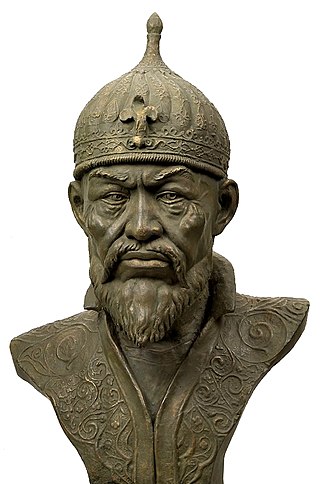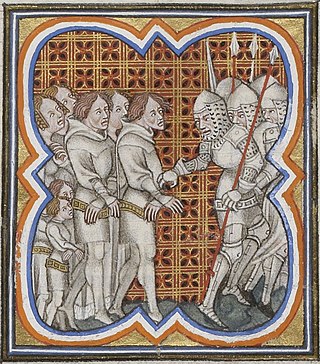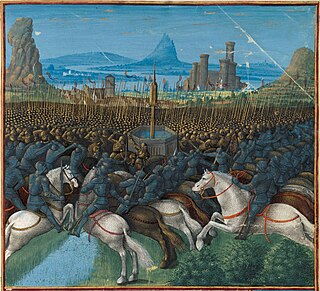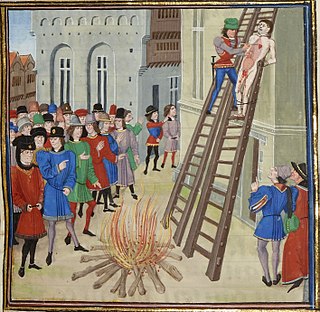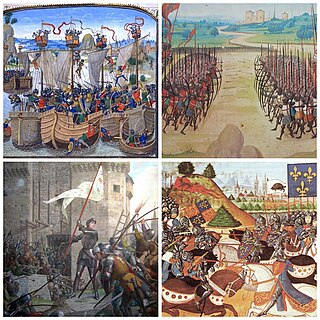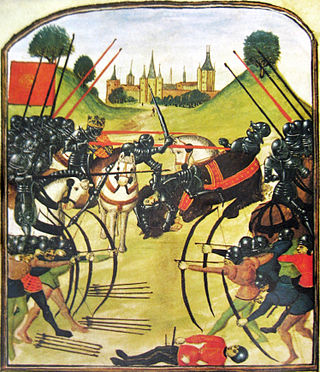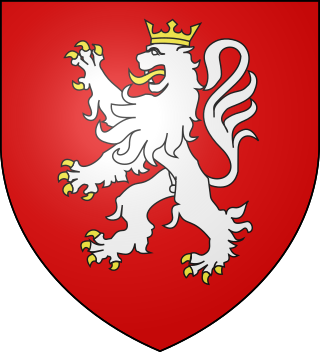This is a list of major battles in the Hundred Years' War, a conflict between France and England that lasted 116 years from 1337 to 1453. There are 62 of them.
| Year | Battle | Victor | Details | |
|---|---|---|---|---|
| 1337 | Battle of Cadzand | | ||
| 1338 | Battle of Arnemuiden | | The first naval battle using artillery, as the English ship Christofer had three cannons and one hand gun. | |
| 1340 | Battle of Sluys | | 24 June Edward III destroys the Franco-Genoese fleet of Philip VI of France off the coast of Flanders ensuring England will not be invaded and that the majority of the war will be fought in France. | |
| 1340 | Battle of Saint-Omer | | The battle of Saint-Omer was the culmination of the northern fork of Edward's campaign and resulted in a tactical stalemate but forced a strategic withdrawal for the Anglo-Flemish forces. | |
| 1340 | Siege of Tournai (1340) | | Tournai was relieved. | |
| 1341 | Battle of Champtoceaux | | ||
| 1342 | Battle of Brest | | ||
| 1342 | Battle of Morlaix | | ||
| 1345, August | Battle of Bergerac | | English attack by Earl of Derby against a French army moving towards Bergerac from Montcoq in Gascony. After a running battle, the English stormed the city and sacked it, taking many prisoners and goods. The French reported heavy losses. | |
| 1345, October | Battle of Auberoche | | English surprise attack by Earl of Derby against a French army at Auberoche in Gascony. [1] | |
| 1346 | Battle of St Pol de Léon | | ||
| 1346 | Battle of Caen | | Caen was sacked. | |
| 1346 | Battle of Blanchetaque | | English army successfully forded the river. | |
| 1346 | Battle of Crécy | | 26 August English longbowmen soundly defeat French cavalry near the river Somme in Picardy.An estimated 4,000 French are killed. | |
| 1346 | Battle of Neville's Cross | | ||
| 1346–1347 | Siege of Calais | | On 1 August 1347, the city surrendered. Edward allowed the surviving citizenry to live, so, after providing them with some provisions, he allowed them to leave the city. | |
| 1347 | Battle of La Roche-Derrien | | Smaller English force defeated a French force 4-5 times larger, featuring the leadership of Sir Thomas Dagworth. [2] | |
| 1350 | Battle of Winchelsea | | English fleet defeats Castilian fleet in a close fight. | |
| 1351 | Capture of Saint-Jean-d'Angély | | ||
| 1351 | Battle of Ardres | | ||
| 1351 | Combat of the Thirty | | Thirty French Knights from Chateau Josselin under Beaumanoir call out and defeat thirty English Knights under Pembroke and Robert Bramborough. | |
| 1352 | Battle of Mauron | | 10 August, small victory of Brittany-French forces against Brittany-English ones. | |
| 1353 | Capture of Lusignan | | ||
| 1353 | Battle of Comborn | | ||
| 1354 | Battle of Montmuran | | Easter 1354, victory of Brittany-French forces against English ones. | |
| 1356 | Battle of Poitiers | | Edward the Black Prince captures King John II of France, France plunged into chaos. | |
| 1364 | Battle of Cocherel | | 16 May, near Houlbec-Cocherel, victory of Brittany-Burgundy-Gascony forces against Navarrese-English ones. | |
| 1364 | Battle of Auray | | 29 September, end of Breton War of Succession Du Guesclin captured. | |
| 1367 | Battle of Nájera (Navarette) | | Black Prince defeats a Castilian / French army at Nájera in Castile. | |
| 1369 | Battle of Montiel | | 14 March, in Castille, Castilian / French army defeats a Castilian / Portuguese force. | |
| 1370 | Siege of Limoges | | ||
| 1370 | Battle of Pontvallain | | 4 December, the Brittany-French army defeats English forces. | |
| 1372 | Battle of La Rochelle | | Castilian fleet defeats the English fleet, leading to loss of dominance at sea and French piracy and coastal raids. | |
| 1373 | Battle of Chiset | | ||
| 1382 | Battle of Roosebeke | | 27 November, a French-Burgundy-Brittany-Norman army defeats a Flemish force twice more numerous. | |
| 1383 | Siege of Ypres | | 8 June - 8 August, occurs during Despenser's Crusade. The English are routed. | |
| 1385 | English invasion of Scotland | | July, Jean de Vienne, having successfully strengthened the French naval situation, lands an army in Scotland, but is forced to retreat. | |
| 1385 | Battle of Aljubarrota | | 14 August, heavy defeat of Franco-Castilian forces by Portugal, strengthened by English longbowmen. Marks the end of 1383–1385 Portuguese interregnum. | |
| 1387 | Battle of Margate | | English fleet defeats Franco-Castilian-Flemish fleet, ending the threat of a French invasion of England. | |
| 1404 | Battle of Blackpool Sands | | ||
| 1415 | Siege of Harfleur | | ||
| 1415 | Battle of Agincourt | | 25 October, English longbowmen under Henry V defeat French under Charles I d'Albret. 6000 French died. 400 English died. | |
| 1418–1419 | Siege of Rouen | | 31 July - 19 January 1419, Henry V of England re-gains a foothold in Normandy. | |
| 1419 | Battle of La Rochelle | | Castilian fleet defeats the English fleet. | |
| 1420 | Battle of Fresnay | | 3 March, the Battle resulted in the defeat of a large Franco-Scottish army. | |
| 1421 | Battle of Baugé | | 22 March, the French and Scottish forces of Charles VII commanded by the Earl of Buchan defeat an outmanoeuvred English force commanded by the Henry V's brother, the Duke of Clarence, who is killed, forcing Henry to return to France where he will die. | |
| 1422 | Siege of Meaux | | Henry V falls ill during the siege. He is taken to Chateau de Vincennes, where he dies aged 35yrs | |
| 1423 | Battle of Cravant | | 31 July, the French and Scottish army is defeated at Cravant on the banks of the river Yonne. | |
| 1423 | Battle of La Brossinière | | 26 September, Brittany-French forces annihilates an English army. | |
| 1424 | Battle of Verneuil | | 17 August, the French and Scottish forces are decisively defeated in what becomes a ’second Agincourt’ for the French. | |
| 1426 | Battle of St. James | | 6 March, a French besieging army under Arthur de Richemont was dispersed by a small force under Sir Thomas Rempstone in Brittany. | |
| 1428 | Siege of Orléans | | 12 October - 8 May 1429 English forces commanded by the Earl of Salisbury, the Earl of Suffolk, and Talbot (Earl of Shrewsbury) lay siege to Orleans, and are forced to withdraw after a relief army accompanied by Joan of Arc arrives at the city. | |
| 1429 | Battle of the Herrings | | English force under Sir John Fastolf defeats French and Scottish armies. | |
| 1429 | Battle of Jargeau | | 12 June. French forces recaptured the neighboring district along the Loire river. The English suffered heavy losses. | |
| 1429 | Battle of Meung-sur-Loire | | ||
| 1429 | Battle of Beaugency | | English surrendered the town. | |
| 1429 | Battle of Patay | | 18 June, a French army under La Hire, Richemont, Joan of Arc, and other commanders break through English archers under Lord Talbot and then pursue and mop up the other sections of the English army, killing or capturing about half (2,200) of their troops. The Earl of Shrewsbury (Talbot) and Hungerford are captured. | |
| 1430 | Siege of Compiègne | | Otherwise a minor siege, both politically and militarily, and ultimately ended in a defeat for the Burgundians, the capture of Joan of Arc was an important event of this phase of the war. | |
| 1435 | Battle of Gerberoy | | La Hire defeats an English force under Arundel. | |
| 1449 | Battle of Rouen | | 29 October, Rouen is regained from the English by a Brittany-French force. | |
| 1450 | Battle of Formigny | | A French force under the duke of Bourbon and Richemont defeats an English force under Thomas Kyriell. 3,774 English deaths and 1,500 captured. Thomas Kyriel, the English general, was captured in action. | |
| 1453 | Battle of Castillon | | A French army, under Jean Bureau, defeats an English army under John Talbot to end the Hundred Years' War. This was also the first battle in European history where the use of cannon was a major factor in determining the victor. John Talbot was killed in action. 4,000 English killed in this battle. |

